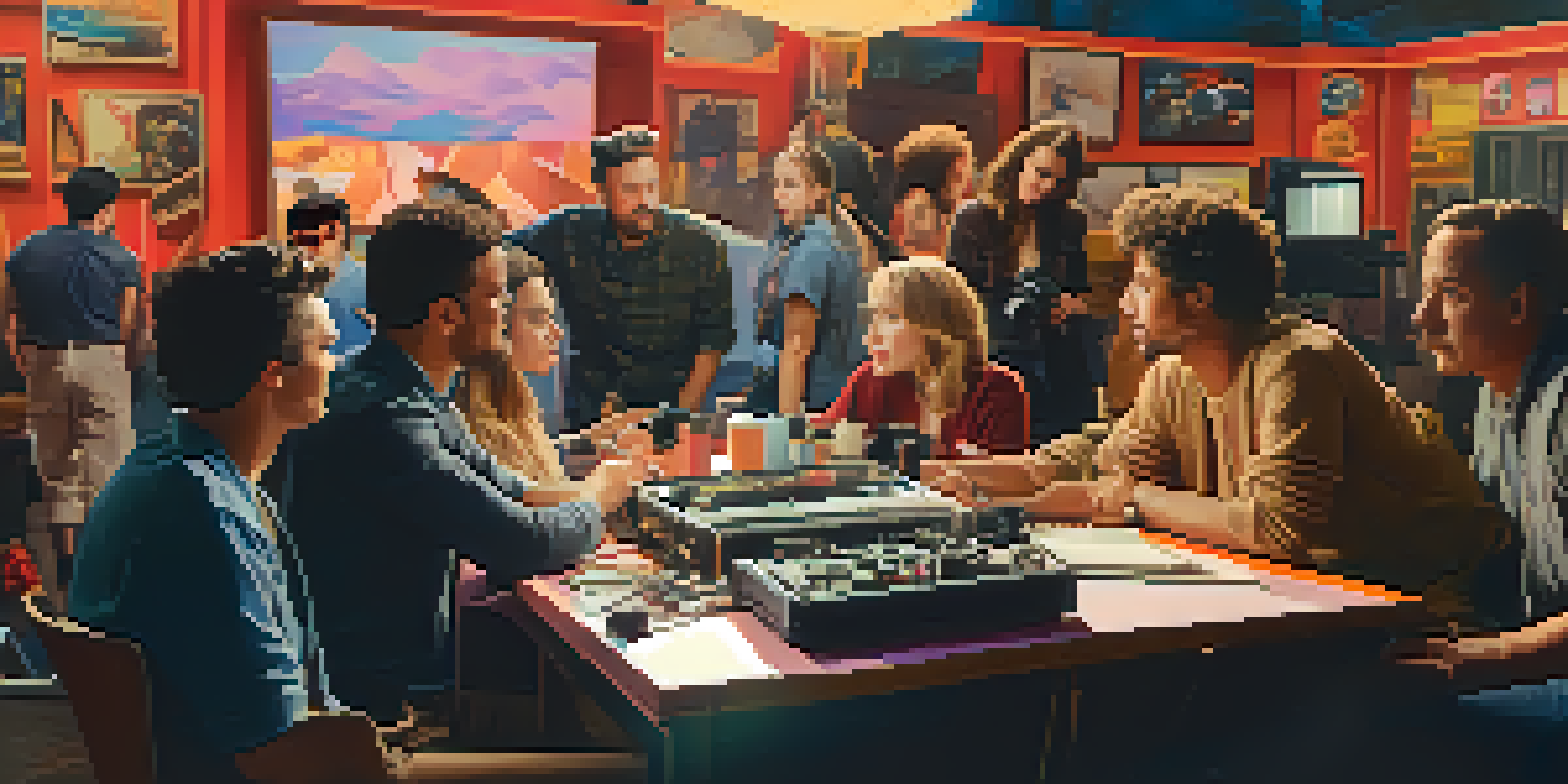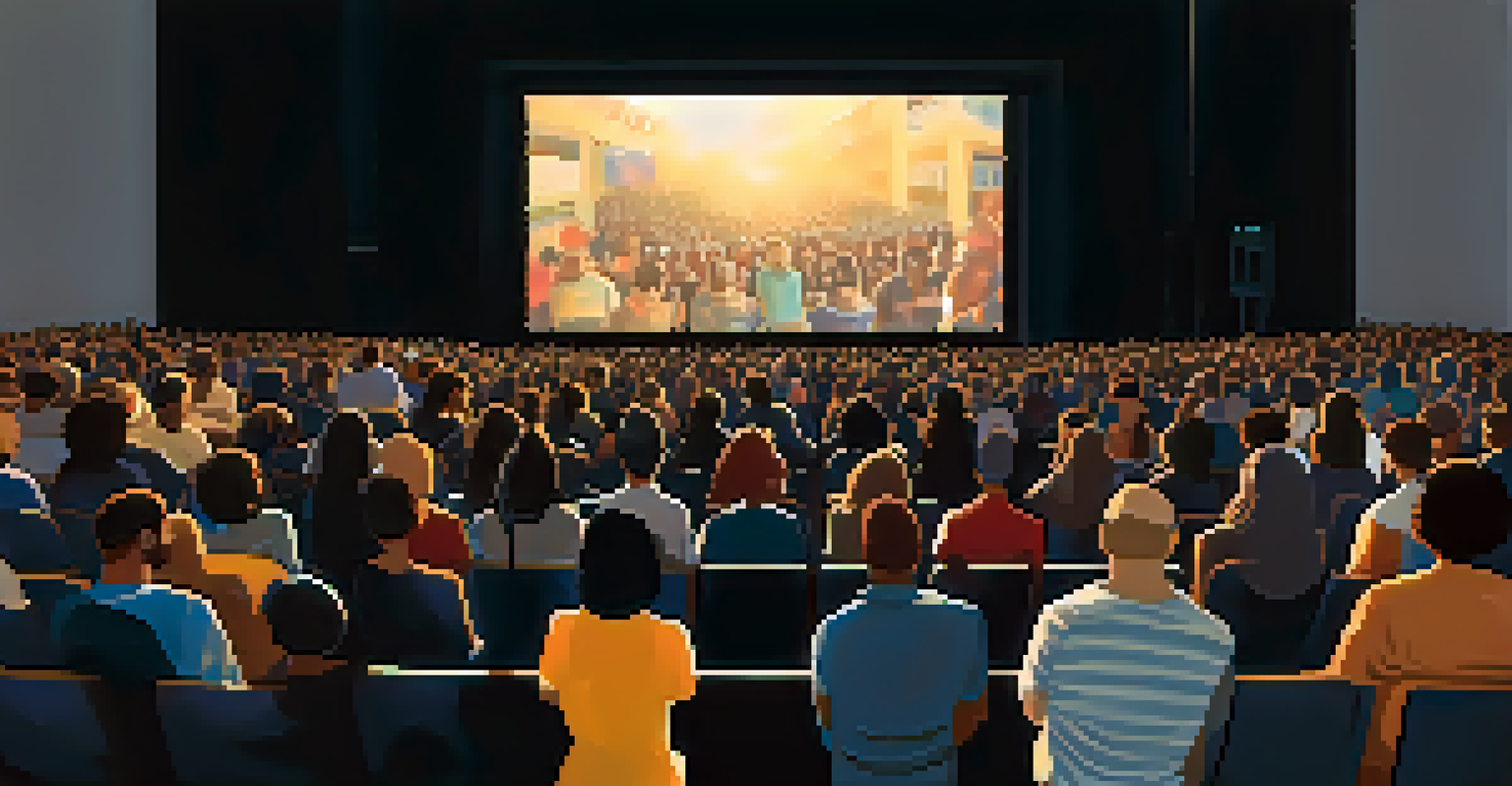The Influence of Hollywood on Global Political Narratives

The Power of Storytelling in Politics
Storytelling has been a cornerstone of human communication for centuries, and in today’s world, it plays a pivotal role in shaping political narratives. Hollywood, with its vast reach, crafts stories that resonate with audiences, influencing their perceptions of political issues. A compelling narrative can transform complex topics into relatable tales, making them more digestible for the general public. For instance, films like 'The Pursuit of Happyness' can evoke empathy and drive discussions about economic inequality.
The stories we tell ourselves about ourselves are the most important stories we will ever tell.
Moreover, these narratives often reflect and amplify the cultural zeitgeist, highlighting social issues that might otherwise be overlooked. Through character-driven stories, Hollywood presents political themes in a way that encourages viewers to engage with them on a personal level. This emotional connection can lead to increased awareness and activism, as audiences are inspired to take action based on what they’ve seen on screen.
In this way, Hollywood not only entertains but also educates, making it a powerful player in the political arena. By blending entertainment with a moral message, films can shift public opinion and even influence policy decisions. Just as ancient storytellers shaped their societies, modern filmmakers continue to wield significant influence over how we understand and react to political events.
Hollywood's Role in Shaping Ideologies
Hollywood often serves as a mirror reflecting societal values and ideologies, but it can also shape them. The themes and characters portrayed in films can reinforce or challenge existing beliefs, effectively molding public discourse. For instance, the portrayal of heroes and villains in action films often aligns with broader ideological divides, subtly guiding viewers toward specific viewpoints. This ideological framing can lead to a more polarized understanding of complex issues.

Additionally, through its global reach, Hollywood has the power to export American values and political ideologies around the world. Films that glorify democracy, individualism, and capitalism can promote these ideals in countries with different political systems. For example, the success of superhero films often emphasizes themes of justice and morality, which can resonate with audiences in various cultural contexts, influencing their perceptions of governance and authority.
Storytelling Shapes Political Views
Compelling narratives in Hollywood transform complex political topics into relatable stories that engage and influence public opinion.
However, this influence is not without criticism. Many argue that Hollywood's portrayal of certain issues can lead to oversimplification and stereotyping. By focusing on specific narratives, the industry risks marginalizing other perspectives, leading to a skewed understanding of global politics and cultures.
Documentaries and Real-World Impact
While fictional films often dominate Hollywood, documentaries have emerged as a powerful tool for political advocacy. These films aim to educate audiences about pressing social issues, often sparking conversations that lead to real-world change. Documentaries like '13th,' which explores systemic racism in the U.S., have garnered critical acclaim and increased awareness of complex political matters. Through factual storytelling, these films can enlighten viewers and inspire action.
Documentaries are the one place where you can really explore the truth of the human experience.
Moreover, the accessibility of streaming platforms has amplified the reach of documentaries, allowing them to capture global audiences. This accessibility means that important stories from around the world can find their way into homes, raising awareness about struggles faced in different regions. As more people engage with these narratives, it creates a ripple effect, encouraging discussions that can influence political decisions.
In essence, documentaries serve as a bridge between entertainment and activism, utilizing the power of visual storytelling to promote social justice. They often challenge viewers to confront uncomfortable truths and advocate for change, proving that Hollywood can be much more than just a source of entertainment—it can be a catalyst for social reform.
The Globalization of Hollywood Narratives
With Hollywood's global influence, the narratives it creates are often reinterpreted in different cultural contexts. As films travel beyond American borders, they are adapted to resonate with local audiences, which can lead to a blending of cultural perspectives. This globalization of narratives not only enhances Hollywood’s reach but also fosters cross-cultural dialogue about political issues. For example, the adaptation of American films into local contexts can introduce new themes or alter characters to better reflect societal norms.
However, this phenomenon can also lead to cultural homogenization, where unique local narratives are overshadowed by dominant Hollywood tropes. As international audiences consume American media, there’s a risk that their own stories and political struggles may be marginalized. This can create a one-dimensional view of global politics, where the complexities of local issues are simplified to fit Hollywood's storytelling model.
Hollywood Influences Global Ideologies
The portrayal of themes and characters in films can reinforce or challenge societal beliefs, shaping political discourse worldwide.
Ultimately, the globalization of Hollywood narratives presents both opportunities and challenges. While it can promote understanding and solidarity among different cultures, it also necessitates a critical examination of how these narratives are constructed and presented. As audiences, we must remain aware of the narratives we consume and their potential impact on our understanding of global politics.
Political Figures in Hollywood: Allies or Adversaries?
The intersection of politics and Hollywood has seen numerous political figures transition into the entertainment industry and vice versa. Celebrities like Ronald Reagan and Arnold Schwarzenegger have successfully navigated this crossover, shaping political narratives through their celebrity status. Their influence often extends beyond the political arena, as their films and public personas contribute to their political capital. This blending of roles can complicate the public's perception of political issues.
Moreover, Hollywood's support for certain political figures can significantly impact their public image and electoral success. The backing of influential celebrities can mobilize younger voters and shift public opinion in favor of a candidate. Campaigns that leverage Hollywood endorsements often see increased media attention, which can be crucial in tight races. This dynamic illustrates how intertwined political narratives and celebrity culture have become in modern society.
However, this relationship is not without its critics. Some argue that the glamorization of politics through Hollywood can trivialize serious issues, reducing complex political conversations to sound bites and flashy visuals. As a result, it’s essential for audiences to critically engage with the narratives being presented and consider the implications of celebrity influence in politics.
Censorship and Control in Hollywood
Censorship remains a pertinent issue in Hollywood, where political narratives can be shaped or silenced by various forces. Governments, corporations, and even public opinion can dictate what stories are told and how they’re portrayed. For example, films that challenge government policies or corporate practices may face pushback, leading to alterations or even bans. This form of control can significantly impact which narratives are allowed to flourish in the public sphere.
In addition to external pressures, self-censorship within Hollywood can also shape political narratives. Filmmakers may choose to avoid contentious topics or portrayals to protect their careers or financial backing. This reluctance can lead to a homogenization of stories, where only safe, palatable narratives make it to the screen. Consequently, audiences may miss out on diverse perspectives that could foster deeper understanding of global political issues.
Documentaries Drive Real Change
Documentaries serve as powerful tools for advocacy, educating audiences on social issues and inspiring real-world action.
Despite these challenges, many filmmakers continue to push boundaries and address controversial subjects. Independent films and documentaries often emerge as a response to censorship, providing alternative narratives that challenge mainstream portrayals. This ongoing tension between creativity and censorship exemplifies the complex landscape of Hollywood's influence on political narratives.
The Future of Political Narratives in Hollywood
As we look toward the future, the role of Hollywood in shaping political narratives is likely to evolve further. With the rise of digital platforms and changing consumer behaviors, filmmakers have more opportunities than ever to craft stories that resonate with diverse audiences. This new landscape can lead to the emergence of narratives that challenge traditional power structures and highlight underrepresented voices. For instance, films and series that focus on marginalized communities can help to broaden the conversation around global politics.
Moreover, the increasing awareness of social issues among audiences is pushing Hollywood to engage in more meaningful storytelling. Viewers are becoming more discerning, demanding authenticity and depth in the narratives they consume. This shift could encourage filmmakers to address complex political themes with greater nuance, fostering a more informed public discourse. As a result, we may see an influx of stories that tackle pressing global challenges, such as climate change and social justice.

Ultimately, the future of political narratives in Hollywood holds great potential for both entertainment and advocacy. By embracing diverse perspectives and tackling difficult issues, Hollywood can continue to be a powerful force in shaping global political narratives. As audiences, we play a crucial role in this evolution, advocating for stories that reflect the complexities of our world and inspire meaningful change.